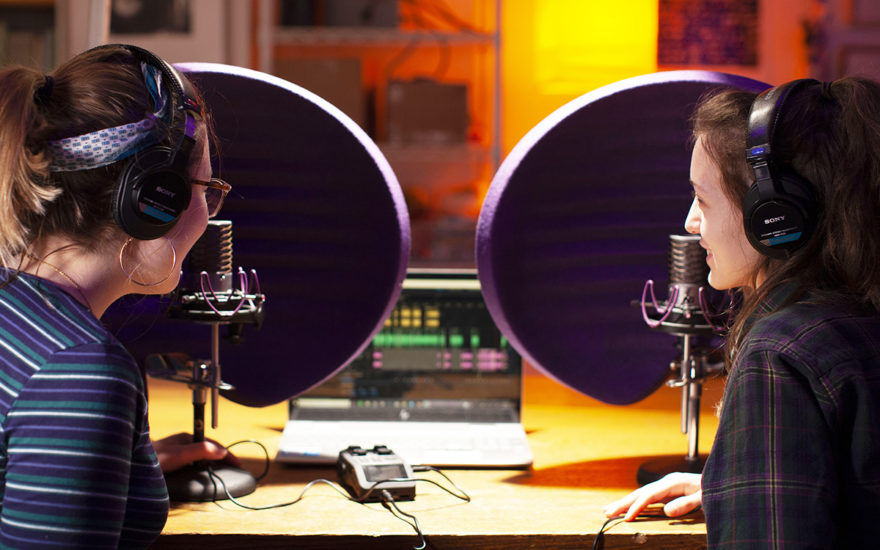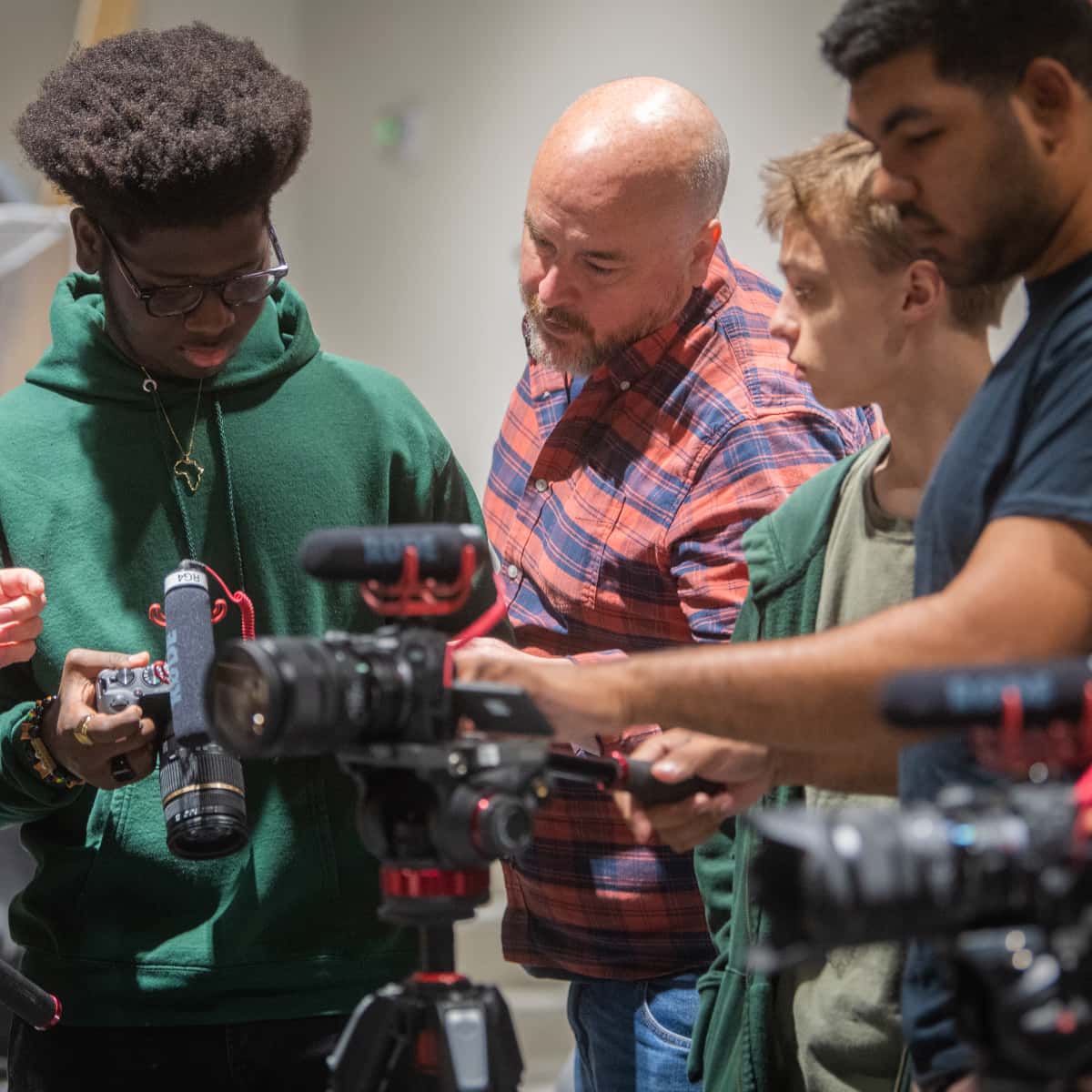Study at the crossroads of theory and practice. Our interdisciplinary program in media, culture, and the arts (MCA) gives your passions a directed focus and artistic outlet. Whether you want to direct films or produce music, you can study the arts with our talented practitioner-faculty while you immerse yourself in your own creative work.


Why study media, culture, and the arts at Clark?
- Explore contemporary hybrid and emerging forms such as digital film scoring, virtual reality, video essays, podcasting, and microbudget social documentary.
- Create and collaborate in the wider context of Clark’s Visual and Performing Arts Department (V&PA), a tight-knit community that includes students majoring in art history; media, culture and the arts; music; screen studies; studio art; and theater arts.
- Benefit from a multidisciplinary focus, and learn from professors in the departments of English; Language, Literature, and Culture; Psychology; Sociology; and Visual and Performing Arts, among others.
- Apply
- Request Info
Are you ready to take the first step?
Featured Courses
New Media, Youth Action and Social Change
Explore shifts in global (and local) emerging technologies, and how they’re redefining global communications. You’ll take special note of internet technologies and their impact on youth action and social change.
Radio Journalism in the Community
Master the stylistic and technical requirements of radio reporting, editing, producing, and broadcasting while reporting on the surrounding Worcester community and working with college and professional stations.
Social and Cultural Issue Documentary Production
An advanced workshop in documentary production. Using digital video technology, students will design, produce, and edit a short documentary on a contemporary social or cultural issue. Student films will be viewed and critiqued in class. In-class screenings, readings, and discussions will identify and analyze the elements of effective non-fiction storytelling, and will explore realities and […]
MCA defines media as artworks and forms of mass communication, including pre-electronic analog through digital forms. The program’s courses address performance, broadcast, installations, print (from literature to journalism), design (2D, 3D, graphic), photography, film and video production, theater, music and sound, visual fine arts, and all “new” and developing manifestations of media.
As a student in the media, culture and the arts major, you will take courses that familiarize you with a range of cultural theories and historical approaches to media production, which are relevant to the functioning of media in a diverse and globalizing cultural environment. You also take a range of courses in media production.
Career Communities are industry-focused groups designed to support your professional exploration and narrow down your career interests within specific fields. You’ll connect to opportunities, professionals, and information that will support your career development. The following communities may be of interest:
Arts, Media, Design, and Communications
Business, Marketing, and Entrepreneurship
My artwork has evolved from drawing and painting to exploring other media. I’m watching my skills grow and develop, as well, in the media, culture and the arts program. And I can’t wait to see where it takes me.
Alli Jutras
Class of 2019
The Clark Experience
The Clark Experience brings together the exceptional education you’ll receive in the classroom and so much more. Through focus and flexibility, it ensures you’ll leave Clark with the creativity, confidence, and resilience to succeed and lead a life of meaning and consequence.
Frequently Asked Questions
What can I do with a major in media, culture, and the arts?
At Clark you’ll get more than a great education; you’ll also be prepared for a long, productive career and life of consequence. And once you’ve completed your degree, you can join other Clark alumni who have gone on to work for great organizations and attend some of the best graduate schools in the world.
What skills will I learn?
- Historical and archival research
- Critical analysis and theoretical writing
- Interdisciplinary media production
What facilities are available?
The Visual and Performing Arts Department facilities available for your use as an MCA major are:
- Traina Center for the Arts, a renovated 19th-century Romanesque Revival building, contains studios for design, painting, drawing, and printmaking; the Schiltkamp Gallery for student and professional exhibits; a darkroom for analog photography; the Fuller Multimedia Center, with digital editing equipment; and the Media Arts Study Hub. The attached 194-seat Razzo Hall is used regularly for recitals, screenings, lectures, and other programs.
- Estabrook Hall contains music rehearsal space, a recording studio, and practice rooms.
- The Little Center, Clark’s theater building, houses:
- The Michelson Theater — a 120-seat black box theater used for all theater productions
- The Experimental Theater — a 30-seat theater used for student productions and student groups, as well as for “read-throughs” of student-written plays
- Costume design shop
- Set building shop
Are there academic achievement awards for media, culture, and the arts majors?
Patricia M. Plamondon Undergraduate Award in Visual and Performing Arts
The Patricia M. Plamondon Award is given to juniors and seniors who have demonstrated their talent in and commitment to the arts and for whom the award will serve to enhance their studies, research, or project-related travel. The award is made annually by a vote of the full-time faculty of the Department of Visual and Performing Arts.
Is there a media, culture, and the arts honors program?
During your junior year, you might be accepted into the media, culture and the arts honors program. Joining the program means you’ll work closely with a professor to create a thesis on a topic of your choice. Examples of recent honors topics are:
- A study of autobiographical documentary, coupled with a short documentary on the experience of restaurant servers
- A semester-long podcast series on millennial “sadness culture,” along with three portfolio podcasts on various subjects
- A research thesis on autobiographical comics, coupled with a production of thirty short-form comic strips
Be a force for change.
Come study at a small research university with a strong liberal arts core.

